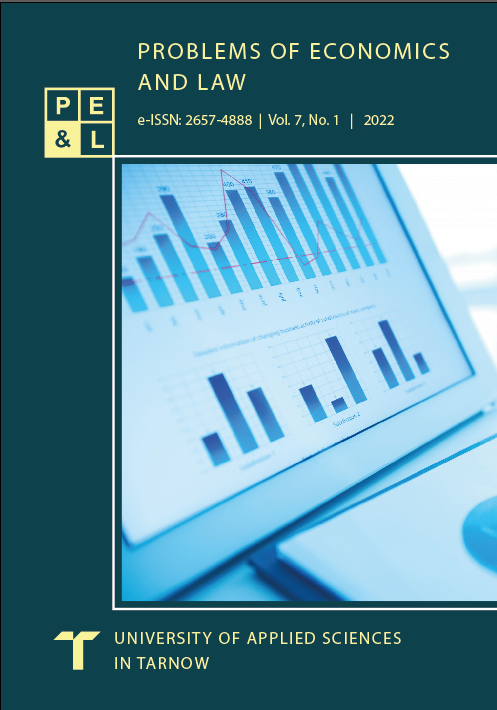Macroeconomic and microeconomic costs and methods of counteracting unemployment
DOI:
https://doi.org/10.55225/pel.411Keywords:
unemployment, osts of unemployment, methods of counteracting unemployment, economic policy towards unemploymentAbstract
Purpose of the article: The aim of the study is to determine the macroeconomic and microeconomic costs and methods of counteracting unemployment.
Materials and methods: The desk search method was used in the research. The rich achievements of domestic and foreign literature were used, the selection criterion of which was high quality, originality and topicality. In the empirical research covering the years 2019–2021, data from the publications of the Central Statistical Office in Poland were used.
Results: On the basis of the literature on the subject, theoretical conditions of unemployment were determined, and on the macroeconomic and microeconomic level, the negative consequences of unemployment were discussed and the methods of counteracting it through economic policy were characterized. In the empirical area of the work, the negative impact of the COVID-19 pandemic on unemployment in Poland in general and in the scale of voivodships was indicated, as well as the response of public authorities to the perturbations on the labor market in this period was characterized.
Conclusions: The problem of unemployment generates negative effects (unemployment costs) in individual and economic terms. There is a need to implement effective corrective measures that enable the fight against unemployment through properly conducted state macroeconomic and microeconomic policy. An example is combating unemployment through economic policy programs implemented during the fight against the COVID-19 pandemic, which was expressed in a series of diversified measures, mainly of a financial nature, with the overarching goal of protecting jobs.
Downloads
References
Borowska-Kwasik, Z. (1998). Ekonomia. Łódź: Przedsiębiorstwo Specjalistyczne „Absolwent”. Google Scholar
Cieślukowski, M. (1998). Ekonomiczne skutki i metody ograniczania bezrobocia. Ruch Prawniczy, Ekonomiczny i Socjologiczny, 60 (3–4), 261–278. Google Scholar
Dębkowska, K., Kłosiewicz-Górecka, U., Szymańska, A., Ważniewski, P., Zybertowicz, K. (2021). Tarcza Antykryzysowa... Koło ratunkowe dla firm i gospodarki? Warszawa: Polski Instytut Ekonomiczny. Dostępny w Internecie: https://pie.net.pl/wp-content/uploads/2021/09/PIE-Raport_Tarcze-antykryzysowe.pdf [dostęp: 2022-03-01]. DOI: https://doi.org/10.33226/1231-7853.2021.1.4 Google Scholar
Drela, K. (2014). Socjologia i inne nauki o pracy i bezrobociu – część I. Zeszyty Naukowe Zachodniopomorskiej Szkoły Biznesu Firma i Rynek, 1, 87–99. Google Scholar
Firlej, K.A. (2018). Zawodność rynku w obszarze kreowania innowacyjności gospodarki. W: K. Przybylska (red.). Zawodność rynku w teorii i praktyce (s. 59–82). Kraków: Wydawnictwo Naukowe PWN. Google Scholar
GUS. (2021a). Bezrobocie rejestrowane. I–III kwartał 2021 r. Warszawa: Główny Urząd Statystyczny. Google Scholar
GUS. (2021b). Bezrobocie rejestrowane I–IV kwartał 2020 r. Warszawa: Główny Urząd Statystyczny. Google Scholar
GUS. (2021c). Wybrane aspekty rynku pracy w Polsce. Aktywność ekonomiczna ludności przed i w czasie pandemii COVID-19. Warszawa: Główny Urząd Statystyczny. Google Scholar
Kalinowska-Nawrotek, B. (2002). Bezrobocie wśród kobiet polskich w okresie transformacji. Raporty, Opracowania, Referaty, 21, 78–85. Google Scholar
Karwacki, A., Błędowski, P. (2020). Bezrobocie jako współczesna kwestia społeczna – wybrane aspekty socjologiczne i ekonomiczne. Studia Socjologiczne, 1(236), 135–164. Google Scholar
Kwiatkowski, E. (2007). Bezrobocie. Podstawy teoretyczne. Warszawa: Wydawnictwo Naukowe PWN. Google Scholar
Liszka, M., Barwińska-Małajowicz, A. (2016). Problem bezrobocia osób młodych w Polsce na przykładzie województwa podkarpackiego. Przedsiębiorstwo i Region, 8, 123–138. DOI: https://doi.org/10.15584/pir.2016.8.12 Google Scholar
Łoboz, P. (2020). Bezrobocie jako problem społeczny XXI wieku – perspektywa społeczna i gospodarcza. W: N. Laurisz (red.). Wyzwania i problemy społeczne początku XXI wieku. Kraków: Fundacja Gospodarki i Administracji Publicznej. Google Scholar
Mankiw, N.G., Taylor, M.P. (2016). Makroekonomia. Warszawa: Polskie Wydawnictwo Ekonomiczne. Google Scholar
Marciniak, S. (2013). Makro i mikroekonomia: podstawowe problemy współczesności. Warszawa: Wydawnictwo Naukowe PWN. Google Scholar
Milewski, R. (1994). Elementarne zagadnienia ekonomii. Warszawa: Wydawnictwo Naukowe PWN. Google Scholar
Milewski, R., Kwiatkowski, E. (red.). (2018). Podstawy ekonomii. Warszawa: Wydawnictwo Naukowe PWN. Google Scholar
Mlonek, K. (1992). Tradycja badań bezrobocia w Polsce – zagadnienia metodologiczne. Wiadomości Statystyczne, 37(6), 1–6. Google Scholar
Niedzielski, E., Domańska, L. (2005). Bezrobocie a rozwój gospodarczy. Polityka Społeczna, 5–6, 15–18. Google Scholar
Olak, A. (2014). Zjawisko bezrobocia a zagrożenie społeczne. Modern Management Review, 19(21), 141–155. DOI: https://doi.org/10.7862/rz.2014.mmr.52 Google Scholar
Pędrak, M., Fierek, M.T. (2018). Teoretyczne aspekty bezrobocia. Zeszyty Naukowe Gdańskiej Szkoły Wyższej, 21(4), 133–146. Google Scholar
Rak, A.M., Rak, J.M. (2006). Rola państwa w rozwiązywaniu problemów zatrudnienia i bezrobocia. Nierówności Społeczne a Wzrost Gospodarczy, 8, 533–544. Google Scholar
Remya, R. (2019). The impact of economic slowdown on unemployment. International Journal of Trend in Research and Development, Conference Proceeding ESMRP-19, September, 67–69. Dostępny w Internecie: http://www.ijtrd.com/papers/IJTRD20788.pdf [dostęp: 2022-03-01]. Google Scholar
Sowa, B. (2014). Bezrobocie. W: W. Kalita, M. Kurek, I. Piczak, B. Sowa (red.). Ekonomia. Wybrane zagadnienia mikro i makroekonomii. Rzeszów–Przemyśl: Wydawnictwo Wyższej Szkoły Prawa i Administracji. Google Scholar
Turgut, E. (2021). Unemployment and factors affecting unemployment in developing countries. W: O. Ucan (ed.). Discussions between economic agents. Panel data analysis (s. 1–35). Iksad Publishing House. Google Scholar
Urbaniak, B. (1998). Emeryci na łódzkim rynku pracy. W: S. Borkowska, P. Bohdziewicz (red.). Rynek pracy w makroregionie łódzkim (s. 13–22). Łódź: Wydawnictwo Uniwersytetu Łódzkiego. Google Scholar
Zéghal, D., Maaloul, A. (2010). Analyzing value added as an indicator of intellectual capital and its consequences on company performance. Journal of Intellectual Capital, 11(1), 39–60. DOI: https://doi.org/10.1108/14691931011013325 Google Scholar
Downloads
Published
How to Cite
Issue
Section
License
Copyright (c) 2022 Krzysztof Adam Firlej, Marta Matras

This work is licensed under a Creative Commons Attribution-ShareAlike 4.0 International License.





